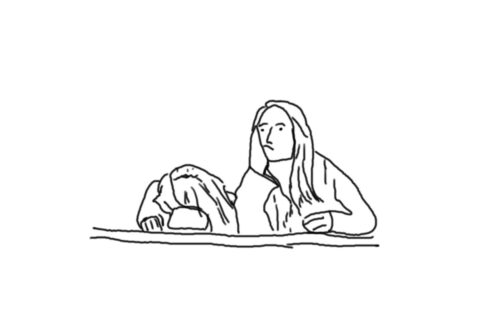Some say that apologetics is dead. We don’t have to argue anymore, we just have to persuade. What we need the power of a good story, not the plodding of old-fashioned teaching.
Now, I’m not against a powerful story. My early faith was deeply influenced by the stories of Nicky Cruz, and other people who experienced the transforming power of God. My own story contains great experiences of the reality of God.
The point is: you can’t argue with a story. You can no more defend a story than you can do mathematical calculations on a feeling. Stories might give you psychological reasons to believe something; they may be powerful enough to persuade you, but they don’t give you reasons to believe something to be true.
If I asked you what makes you think God exists, and Jesus died for your sin, your story might explain how it came about that you presently believe those things to be true, but it does not tell me any reasons for the truth of those beliefs.
In today’s cultural climate, we are more interested in psychology, sociology, and autobiography, than we are in orthodoxy, objectivity, or matters of fact.
However, adequate apologetic ministry ought to go beyond interaction with different worldviews. It should go as far as defending the Christian one, disagreeing with other people, and paying the price for standing up for what’s true even when no one else believes us.
To do all that, one needs a good conception of truth.
If you don’t have the right conception of truth, defending a worldview and attacking other worldviews is going to sound out of place. You are likely to think we shouldn’t be attacking anything.
Yet, the church is called to confront false claims, to defend its beliefs.
Unfortunately, our conception of truth has become so ameliorated that we sometimes think doing such things as arguing, defending, or attacking is morally wrong. Who am I to tell others what to believe? Won’t my words be unloving if they include the claim that they’ve got it wrong?
Some people are genuinely unkind in their words, but this has much more to do with the humility (or lack of it) of some who speak up. Nonetheless, the challenge we face is far more than the challenge to kindness and humility. Of course, we should aspire to speak well to others. Our manner is important. But our manner is not to be had at the expense of the matter on which we speak. Our speech can be humble and utterly polemic at the same time. We can seek to refute falsity with complete conviction while seeking only the good of the person to whom we speak and the glory of the one called us to do so.
There are three challenges to truth that cause us to avoid disagreeing over, defending, and esteeming it. The three challenges are not only challenges to a Christian view of the world, they are challenges to the basis we have for arguing over what is right, defending the Christian worldview, and the value of doing so despite the negative consequences.
The Challenge of Anti-Realism
The first challenge comes from anti-realism, which suggests that there is no such thing as mind-independent truth.
If there is no such thing as mind-independent truth, then there is nothing over which to disagree. Disagreement requires something to disagree about. But if there is no mind-independent thing, something standing outside us, then disagreement comes down to difference. It is merely a fact about us, not a fact about the world and what we say about it.
So, what I want to suggest—no, what I want to argue—is that truth is not dependent on your belief, nor your mind, nor your preference.
Those who disagree are called anti-realists. An anti-realist may find the idea that there are truths ‘out there’ somewhere bizarre.
The objector is making an intuitively plausible point. What exactly could be true apart from our believing it? Truth is just the way we put the world together. It is more about our decisions than about the world.
For example, some people believe that what we mean by truth is just what the most powerful people in a culture tell us. Consequently, truth is nothing more than the way we have been taught to put the world together.
In the movie, An Englishman Who Went up a Hill and Came Down a Mountain, Hugh Grant plays an English official tasked with determining whether a hill in Wales is actually a mountain. After measuring the height of the hill, he determines that it is a few feet short of mountainhood. He informs the residents of the village that their mountain is actually a hill. The residents are astonished and dismayed. Consequently, the villagers set out to increase the size of the hill so that it can be categorized as a mountain.
As you may be thinking, the bureaucratic decision to set an arbitrary height as a minimum for being a mountain is annoying. It is surely a case of government overreach. The same, however, could be said for any village with so much as a mound of earth. What’s to stop them from calling their mound a ‘mountain’? If no one decides what counts as mountain, then surely anything could be a mountain.
This kind of thinking is what the anti-realist uses to motivate his point. The anti-realist will claim that mountains are a ‘human fiction’, one devised because it serves social needs. After all, there is nothing more than convention determining what makes a piece of land a mountain or a hill. The people who decide whether something is a mountain are all locked up in some ivory tower. But what do they really know? The decision to call something a mountain says more about our need than the world. We want things called ‘mountains’ to climb.
Height turns out to be just as problematic. There is no meter stick given to us by God. Instead, we decided socially what a meter is. If we wanted, we could call a meter anything we want. Thus, if there were no people, there would be no such thing as height, let alone meters! Same with mountains. If there were no people, it couldn’t be true that Mount Everest is a mountain or that it is such and such a height. Truths, the anti-realist will tell us, are dependent on us, not on mountains.
This is how many people perceive truth. Truth isn’t out there, independently from us. We adopt ways of perceiving the world and carving it up into mountains and hills. But the mounds of earth don’t have any say in it. We might have decided differently and thus the truth would have been entirely different.
What goes for mountains goes for religion. We adopt certain conventions, certain linguistic habits and conceptual schemes. We talk about ‘creation’ and ‘fall’ and ‘redemption,’ and if we had not done so, sentences such as ‘God created the heavens and the earth,’ ‘Adam and Eve sinned against God,’ and ‘God redeems for himself a people’ wouldn’t be true at all. If there were no people to think them, then they wouldn’t be true.
How do we respond to such a suggestion? Are we to content ourselves to differing, but never really disagreeing? Does truth depend on us in this way?
Perhaps the simplest way to begin to think about the idea is to accept that we do decide how to carve up the world. There is no divinely stipulated measurement we are obliged to use for measuring length. Europeans use kilometers and Americans use miles. It could have been different.
In reply, Peter Van Inwagen, invites us to a little experiment: Let’s imagine that we had adopted another means of measurement. We’ll call this measurement ‘shmight’. Perhaps this includes some alternative division of space. (we can use the words ‘shmigher’, ‘shmigher than’ and ‘shmighest’). Perhaps meters were never thought about. Instead, we have ‘shmeters’. And, Perhaps, we had a different way of determining what counts as a mountain and perhaps we use a different term for mountains. Let’s say we use ‘shmountain’
Now consider the following pair of statements:
x: Mount Everest is 8,847.7 meters high
y: Shmount Everest is 8,773.112 shmeters shmigh
If true, then the statements represents a mind-independent state of affairs in the world. What makes the statement true is that it corresponds to the world. If none of us believed the statement or even knew about it, it would still be a true statement. If no mind existed but the thing we call Mount Everest did exist, then it would be exactly the way we find it. Its shape, size etc. would be as it is whether anyone ever believed anything about it.
If so, then the proposition that ‘Mount Everest is 8,847.7 meters high’ would still be true (the truth value of the proposition transcends our minds). But the same is true of ‘Shmount Everest is 8,773.112 shmeters shmigh.’
It doesn’t seem to matter what conventions we use. Whether or not those statements are true is not decided by convention; it is decided by the properties the object actually has. Realism is not the thesis that the conventions of our language could not have been other than what they are. It is the thesis that what makes any of them true is the mind-independent reality.
The same is true for statements about God, salvation, and the claims of the Bible. Just because we adopt a certain way to talk about the world, what makes any of those statements true or not is the world to which they correspond. A group of Christians (i.e. the church) is not merely a group of people who have adopted a way to speak about the world. It is also a group of people who claim that those sentences express true propositions. And what makes those propositions true or not is not reducible to the kind of talk they have adopted. Rather, the truth of those propositions is determined by the way the world actually is. As Van Inwagen writes,
“Our beliefs and our assertions represent the World as being a certain way, and the belief or assertion is true if the World is that way, and false if the World is not that way…The truth or falsity of our beliefs and assertions is therefore “objective” in the sense that the truth and falsity are conferred on those beliefs and assertions by their objects, by the things they are about.” (614)
The anti-realist, on the other hand, thinks that there are no truths standing outside us. Indeed, the root of the problem is less that truths stand outside. It is more of a problem that they stand over us:
“[Anti-Realists] are deeply hostile to the thought of anything that in any sense stands in judgment over them. The idea to which they are most hostile is, of course, the idea of their being a God. But they are almost as hostile toward the idea of there being an objective universe that doesn’t care what they think and could make their most cherished beliefs false without even consulting them.” (617)
Our fear of confrontation is driven not only by a desire to please others; it is also driven by a fear that what we will confront someone over is not a thing at all. If truth doesn’t stand outside us—caring not one whit whether we believe it or not—we will always wonder if arguing over it will be worth it.
Next: The Challenge of Skepticism.





